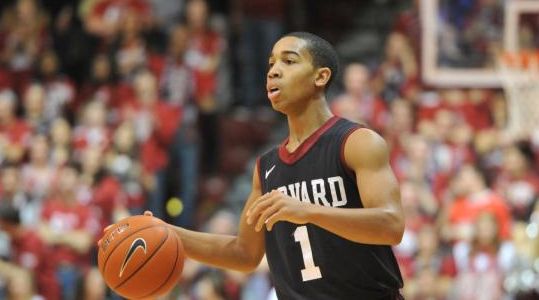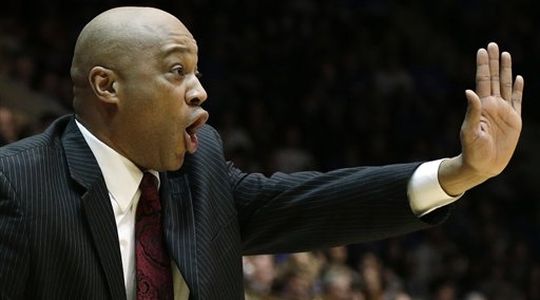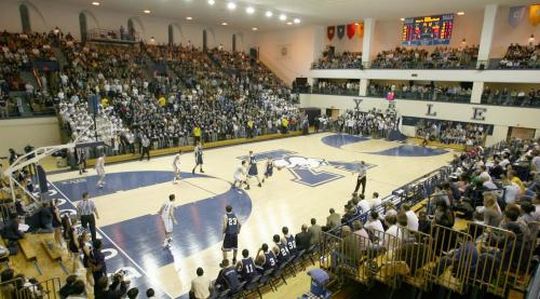CIO… the Ivy League
Posted by Brian Goodman on January 4th, 2013Michael James is the RTC correspondent for the Ivy League. You can also find his musings on Twitter at@mrjames2006 and @ivybball.
Looking Back
- Holiday Revival: Heading into the winter exam break, things looked pretty bad for the Ivies. The league had seven combined wins against the top 200 and nearly two times as many losses against teams outside that range. Then, Princeton grabbed a huge upset at home against top 50 Bucknell and a cascade of strong performances followed. Brown secured the Ivy League’s first win in a game broadcast by its new television partner, NBC Sports Network, by knocking off Providence, and Harvard followed with a road win at California. Even the performances in losses were impressive. Pennsylvania lost in overtime at Wagner before playing No. 17 Butler close. Yale led Iowa State for 30 minutes before falling by 10 points. Harvard led St. Mary’s for 39 minutes before losing by one. In its wins and losses, the Ivy League has shown some considerable improvement over the past two weeks.
- Welcome to Monte Carlo: With league play about to begin, it’s time to refresh the Ivy prediction model and simulate the upcoming campaign based on the quality of each team’s non-conference results. For those unfamiliar with the practice, using Pomeroy-style ratings to measure the quality of each Ivy team, a winning percentage for each league game can be generated, and thousands of seasons can be simulated to find the most common results:
- Both Harvard and Princeton are expected to finish at 11-3.
- Columbia clocks in two games behind at 9-5.
- The rest of the league is a jumble with Cornell and Yale expected to go 6-8 and Penn and Brown expected to land at 5-9.
- Dartmouth falls to the basement, two games back at 3-11.
- With ties allowed, the Crimson wins the title 58 percent of the time and Princeton 54 percent, while Columbia snags a share in seven percent of simulations. Without ties, Harvard wins 41 percent of solo titles, while Princeton grabs 37 percent and Columbia just three percent. An Ivy playoff for the NCAA bid is expected in 19 percent of simulations, so the league office might be actively shopping sites in March for a third straight season.
- Signature Win: Since the 1989-90 season, Ivy teams not named Pennsylvania or Princeton have won just 25 non-conference games against top 100 opposition. Brown has been responsible for four of those notable victories, picking up its fourth last week with a thrilling 69-68 win over Providence, in which the Bears trailed by seven with under a minute to play. The win gave first-year coach Mike Martin his first signature win at the helm of a Division I team. Common threads abound, but the most interesting one is that all of Brown’s top 100 wins have had the Friars as the victim. The most recent one prior to this season occurred in 2006-07, when Craig Robinson, also in his rookie year coaching the Bears, navigated his squad to an ugly 51-41 victory. Robinson would take his team to the CBI Tournament the next year and would leave to take the Oregon State job after that season. Brown fans have to be hoping that Martin, who was a former standout guard for the Bears from 2001-04, will lead them down the former path without exploring the latter.
Reader’s Take
Power Rankings
- Harvard (7-5) – Over the past 17 seasons, there have only been seven regularly used freshmen with a usage rate of 20 percent or greater to post an offensive rating of over 1.1 points per possession. The two most recent members of that lofty group were Amaker recruits Kyle Casey and Laurent Rivard and a third, Siyani Chambers, is currently on pace to join them. After a disastrous performance in the Crimson’s 67-62 victory over California, Chambers finished with 16 points and seven assists against St. Mary’s, nearly willing the team to a second-straight upset. Ultimately, some extremely poor execution down the stretch left Harvard on the losing end of a thrilling 70-69 nail-biter, but the Crimson and its freshman point guard have made it quite clear that the road to the Ivy title still runs through Boston.
- Princeton (5-7) – Not to be outdone, the Tigers matched Harvard performance for performance over the past three games. Princeton went 2-1 against opponents with an average Pomeroy rank of 102, while Harvard posted the same mark against squads with an average Pomeroy rank of 100. As usual, the Tigers have found their stride just as Ivy play is about to begin. In its first nine games, Princeton’s average adjusted offensive rating was 94 points per 100 possessions, while in its last three, that has ballooned to 118. The Tigers spent the first six weeks of the season searching desperately for role players and now have seemed to find two good ones in Denton Koon and Hans Brase. Princeton has just one more non-conference game before hitting the court with Pennsylvania to kick off Ivy play, making this a perfect time to have its pieces falling into place.
- Columbia (7-5) – As the Crimson and Tigers have started to raise their quality of play, the Lions have shown some worrying cracks in their façade. Columbia has the second most efficient starting five offensively behind Harvard, but that mostly derives from the Lions’ ability to avoid turning the ball over, not from its ability to convert shots at decent rate. With Columbia currently holding the record for lowest turnover rate of any Ivy team in the past 17 years, there is some worry that future regression to the mean will be in order, which would put pressure on the Lions’ poor shooters to sink baskets at higher rates. That could also expose a Columbia defense which has averaged a mediocre 104 defensive rating over its past eight games. This all has the makings of a potential house of cards, something Lions fans who watched last year’s collapse in Ivy play know about all too well.
- Brown (4-7) – Since the bottom five Ivy teams are all relatively indistinguishable, languishing quite a distance behind the top three, the Bears’ stunning 69-68 win over Providence is enough to break the tie and slot Brown into the final upper division spot. Of the remaining teams on this list, it should be no surprise that it was the Bears that sprung the upset, given the high-variance nature of the team’s offense. Brown is one of the worst teams in the nation at getting to the free throw line, preferring to hover around the perimeter firing threes. When the shots are falling, gaudy offensive ratings follow. When they’re not, the Bears look like one of the worst teams in the nation. Brown’s offensive ratings over the last six games in order have been 103, 75, 102, 80, 114, 77. Brown will post a handful of 100-plus offensive ratings in Ivy play, likely knocking off one or more of the top three. It’s the dips into the 70s, though, that will keep the Bears from sniffing the title chase.
- Yale (4-10) – It’s not often that a team finds itself garnering praise for three-straight double-digit losses, but the Bulldogs’ performances at Nevada, St. Mary’s and Iowa State were decently impressive. Yale led both the Wolfpack and the Top 50 Cyclones in the second half, before the hosts made late runs to escape with 10-point wins. Against the Gaels, it was a 14-0 run across the halves that provided St. Mary’s with almost all of its 16-point margin of victory. The games against the Gaels and Cyclones were lost on the defensive glass, where Yale has struggled to replace Greg Mangano, who had the 60th best defensive rebounding rate in the nation last year. Armani Cotton is the only Bulldog player to rank in the Top 500 nationally this season, and he sees the court for fewer than 50 percent of his team’s minutes.
- Cornell (6-9) – Since beating Western Michigan in its opener, the Big Red hasn’t picked up a win against a squad ranked outside the worst 75 teams. In only three of its 15 games this season has Cornell registered a better result than would be expected from an average Division I team. Compare that to Princeton, which has eclipsed that mark in five of its last eight games, or Harvard, which has done it in each of its last seven, and it’s clear that one of the popular dark horse picks during the preseason hasn’t shown itself to be any bit the contender to this point. Issues abound, but talent isn’t really one of them. The Big Red does a good job forcing turnovers and a great job cleaning the boards, but the gambles Cornell takes defensively have allowed opponents to get tons of wide open looks and the Big Red’s aggressiveness yields bunches of free throws. Offensively, the team can’t stop itself from shooting threes, despite being terrible from long range. Cornell has some talented individual players, but it is quite the mess as a team.
- Pennsylvania (2-10) – It’s been 11 games, and the Quakers are still searching for their first offensive performance in which they score more than an adjusted point per possession – something every other Ivy except Dartmouth has done at least twice. The culprit has been turnovers, as Pennsylvania has coughed the ball up nearly once every fourth possession. Since 1997, no Ivy team with a turnover rate that high has won more than seven games in league play. Given that three of the remaining five non-conference games are against Top 100 teams, the Quakers might need to get close to that Ivy win ceiling in order to avoid matching the Pennsylvania record of 22 losses in a season set in 2009-10.
- Dartmouth (2-9) – If the Quakers have offensive problems, then the Big Green has an offensive crisis. With a putrid offensive rating of 85.4, Dartmouth currently is the fourth worst offensive Ivy team since 1997 and is only a couple points ahead of the school’s low water mark of 83.0 in 2009-2010. That the Big Green is struggling to score points is nothing new – it has spent six of the last 10 years posting offensive ratings in the 80s. Recently, though, Dartmouth’s defense has been failing it, as it yielded an adjusted 1.20 points per possession to Boston College and 1.13 to Bryant. The only way the Big Green can win games is by getting stops defensively and hoping it can string together a lucky run of makes on the other end. That strategy almost worked against Vermont but hasn’t come close to working in the three games since.
Looking Ahead
- January 6: Florida at Yale, 5:30 PM, NBC Sports Network – That is not a typo. The Gators will visit The Church in a homecoming game for Florida’s senior forward Erik Murphy, who is from neighboring Rhode Island. Last year, hosting this game might have been helpful for the Bulldogs, who trailed by just six with 15 to play in Gainesville, before a 17-6 run helped the Gators cruise to a 20-point win. While Yale looked decent on its three-game road swing to Nevada, St. Mary’s and Iowa State, Florida is in a different class from even the Gaels and Cyclones. The game provides Yale with a great opportunity for some national television time, but probably won’t offer much else.
- January 5: Columbia at Army, 3:00 PM and January 8: Columbia at Holy Cross, 7:00 PM – These are two very tricky games that could help determine whether the Lions are closer to the contenders or the rest of the pack. Each is a road game against a team around the #200 mark nationally, and Columbia’s odds of winning will be roughly 50/50 in both contests. An Ivy favorite should find a way to win both but definitely wouldn’t get embarrassed in either. With losses to similarly ranked Long Island and Marist already dotting the Lions’ resume, losing one of these big or both close might be cause for re-examining Columbia’s status among the league’s elite.
- January 12: Harvard at Dartmouth, 4:00 PM – As is usually the case, the Harvard-Dartmouth travel partner game kicks off the league slate, and has recently been the case, the spread should open in the double digits. The Crimson has won six straight games against the Big Green, but those victories haven’t always been easy. Harvard trailed 36-30 at home to Dartmouth before torching the Big Green with a 30-7 run. In the return game at Leede Arena, the Crimson led just 25-20 with 15 minutes to play before a 19-6 run gave it sufficient breathing room. Don’t be surprised if Dartmouth repeats the pattern and keeps it close for a while in this Ivy opener.
- January 12: Pennsylvania at Princeton, 6:00 PM, NBC Sports Network – The Quakers’ first Ivy game brings them back to the same floor where their final league game happened last year – a loss to the rival Tigers that handed Harvard the solo Ivy title and the league’s NCAA bid. This season, Princeton is a favorite and Pennsylvania is the potential spoiler. The Quakers will be heavy underdogs in this one, but this rivalry is the best in Ivy basketball, as it brings together the league’s two most passionate fan bases.
Resume and Seeding Watch
With most of the non-conference slate complete for the league’s teams, let’s take a look at where the resumes of the Ivy contenders would land them on a seed line, given that they ultimately claimed the regular season title and NCAA bid.
- Harvard – Good Wins: at California, vs. Boston University; Bad Loss: vs. Vermont. The Crimson currently boasts a non-conference RPI in the 70s and a non-conference SOS in the 50s. While the home game with Rice will hurt both of those a bit, even if Harvard is victorious, both metrics should remain stronger than is customarily the case for a one-bid conference school. The only embarrassing performance was at Saint Joseph’s, and the Crimson should get some credit for playing two close losses in a few of its other difficult road games. Projected Seed – #13.
- Princeton – Good Wins: vs. Bucknell, at Kent State; Bad Losses: vs. Northeastern, vs. Fordham (N). The selection committee would likely struggle with the Tigers’ 5-7 record, but rarely does a sub-.500 team have a quality win like Princeton recorded against Bucknell. The RPI has exacted its usual revenge for failing to win the close ones by dropping the Tigers to #168 in non-conference RPI, but the adjusted scoring margin metrics all have Princeton either just inside or just outside the top 100. The body of work against the better teams on its schedule should be just enough to help the Tigers avoid becoming the first Ivy #16 seed since a string of three straight from 1987-89. Projected Seed – #15.
- Columbia – Good Win: at Villanova; Bad Losses: vs. Marist, at Long Island. The Lions have certainly had their moments. Trouncing Villanova on the road and leading Bucknell by 17 at home before ultimately falling showed Columbia at its best. The inability to play at that level consistently, though, has left the Lions with a sub-par resume. Columbia has to win its final two non-conference games just to have a chance at a top 200 non-conference RPI, while its SOS will languish in the 300s. The Lions were the first Ivy team to snag a notable victory, but Columbia has struggled to do anything positive since. Projected Seed – #16.















































